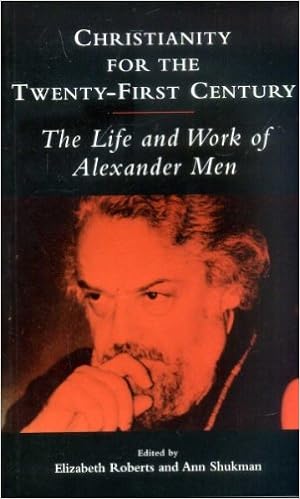Christianity for the Twenty-First Century:
The Life and Work of Alexander Men
Edited By Edith Roberts and Ann Shukman
SCM Press Limited, 1996
ISBN: 033402613
Price: £12.95
Edited By Edith Roberts and Ann Shukman
SCM Press Limited, 1996
ISBN: 033402613
Price: £12.95
During the early part of my journey to
Orthodoxy when I have struggled to reconcile my faith with my wider life, two
great modern thinkers that have helped me through their works are Metropolitan
Anthony Bloom and Fr Alexander Men. Both have a way of explaining issues in a
way that resonates with the western mind, especially with those versed in the
writings of modern French and German philosophers. Though the works of
Metropolitan Anthony seem to appear on bookshelves across the world there is
little available in the English language by Fr Alexander. It was therefore a
great blessing to discover this small collection of his articles, talks and
essays in a London bookstore only a few days before the start of lent.
The text is split into three sections, one on
Christianity in general, another on Russian Christianity and the third giving a
summary of where Christianity was seen to be heading at the time. This
structure allows the reader to see the overview of the problems facing
Christians in the modern world, along with the specific example from Fr
Alexander’s context as well as the solutions and ideas put forward by Fr
Alexander as a way of dealing with the problems and ending with the talk which
Fr Alexander gave on the night before his death. As well as this structure
providing a useful narrative to the collection, it also serves as a way to
understand the ideas and thoughts of Fr Alexander better, letting us see the
world which he faced during his life and to see how he wished to help those
struggling in this.
The first section’s articles speak much on Fr
Alexander’s views regarding issues such as suffering an state Churches. Fr
Alexander was seen as a controversial figure by many due to these positions,
with many accusing him of extreme ecumenism and others speaking out against his
opposition to state churches. The articles in this first section provide a
fascinating insight into the arguments he put forward with regards to this. The
second of these looks at the specific situation in Russia following
Perestroika. In these interviews and articles we see Fr Alexander addressing
the struggle of returning to spirituality and the ‘problem of choice’ faced by
many Russians. These demonstrate the challenges that Russia in regaining its
identity after the fall of the Soviet Union and Fr Alexander’s willingness to
work to address this. The third section provides a summary of the vision for
the future and contains the talk which gives the book its name. These give an
idea of what Fr Alexander saw as the solution to the aforementioned problems.
As mentioned previously, I see the books
structure as one of its biggest strengths. It gives us a good overview of Fr
Alexander’s life and works in a meaningful way. As well as this, I would say
that the book’s other key strength comes from the content itself. Fr Alexander
Men was an extremely thoughtful and prevalent writer during his life, and
though I am reviewing this specific collection it is important to really point
out that the writings themselves are extremely well thought out. Fr Alexander’s
use of western Philosophical writings to express ideas and his love for the
Eastern Mystical tradition both shine through in these works, giving us a real
insight into how much of an important figure Fr Alexander was. The choice made
in the writings allows this to come through with the context of early nineteen-nineties
Russia giving them their setting.
Unfortunately, this focus on the context can
also be seen as the weakness of the text. Fr Alexander wrote close to ten books
on Christian thought in Russia, as well as various theological texts covering
exegesis and Christology. The book’s preoccupation with Fr Alexander’s more
political writings gives the image of a man whose only real focus was on this
situation and plays Fr Alexander as more of a political figure than he really
was, this is not helped by the ominous red figured cover, which again paints Fr
Alexander in this light. The writer explains in the introduction that a
complete summary of Fr Alexander’s work is “a task for another time” but still
suggests that the selection is a broad one which is a claim I disagree
with. I feel that more of an
introduction to Fr Alexander as an Orthodox thinker would be needed for the
text to really give a feel for his prominence in this field.
Overall, the book was a good one to start the
Lenten fast. It served to remind me that in a world where many call themselves
Christian for a national or political identity we should look more at ourselves
and see that our lives are spent in a prayerful search for the true meaning of
this identity and that we should not take half measures or rely on some kind of
national tribalism to make our way easy as it should never be an easy path to
live.


No comments:
Post a Comment